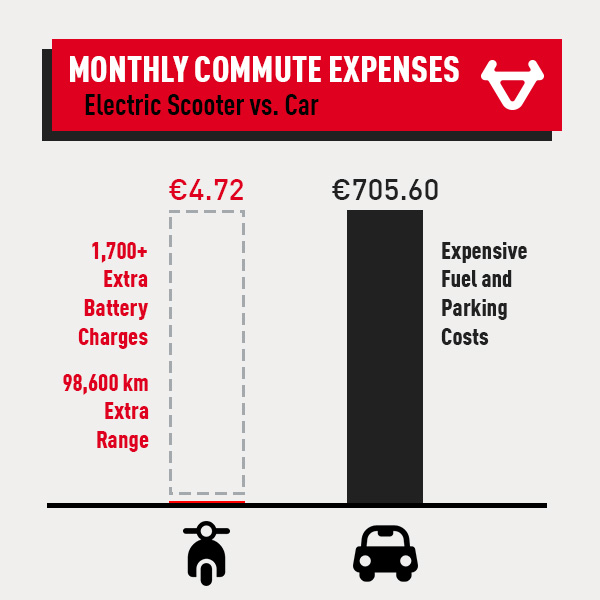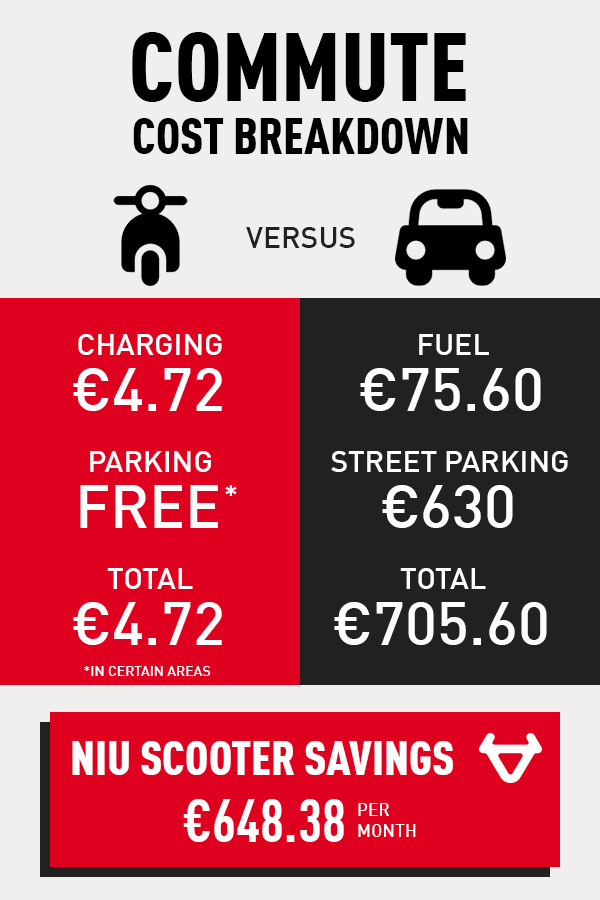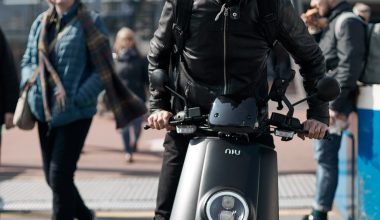You grip the steering wheel tightly, but you aren’t moving. The car ahead of you creeps forward a couple meters, and you do the same. All you can see are red tail lights ahead of you. Smog from the idling cars in front of you fills your nose. For millions around the world, this is the daily commute they endure. Is there a better daily transportation mode?
Previously, we explored the benefits of commuting with an electric scooter compared to the subway. While a NIU scooter is certainly more convenient and cost-effective than public transit, how does a scooter compare to a car? Should I get a scooter or a car?
Let’s look at a quick example of monthly scooter costs to start answering these questions.
How electric scooters cost less
Before we dive in to specifics, let’s use a daily commute example to illustrate some key differences in these transportation modes. Lukas lives in Amsterdam and commutes a total of 28km to work each day. He owns a 2020 Volkswagen Golf commuter car, a popular choice among Europeans.

Driving a commuter car to work throughout the month, Lukas would spend €75.60 on fuel alone. If he parks his car on the street near his work, that will cost a minimum of €30 per day in parking fees, or €630 per month.
These numbers do not even take into account maintenance or insurance costs for a car, which would increase the monthly cost even further.
Compared to his NIU MQi+ Sport electric scooter, which only costs €4.72 per month to charge, that is a significant difference. Depending on where you live, you can often find free parking options for a scooter as well. With that savings, he could charge his battery more than 1,700 times! That is 98,600 km of range!
Let’s review the monthly commute savings for Lukas in Amsterdam:

Commute “fuel” costs
In our above example, Lukas would only pay €0.41 to charge his electric scooter battery, based on the average electricity cost in the Netherlands. On his scooter, that would give him 58km of real range, which means he can ride to work and home for two days before charging.
In Amsterdam, fuel costs are some of the highest in Europe. He would pay €1.53 per liter to travel 11.9km in his relatively fuel-efficient commuter car. That is more than 3x the fee and only a fraction of the distance compared to his NIU scooter.
Parking cost and convenience

As we also just discovered, car parking in major cities is an expensive endeavor.
For the average car owner, your car is actually parked far more often than it is in motion. In the UK, the average car is parked 96% of the time. While cars can be a convenient private transportation method, they take up a lot of space and are not in use the vast majority of the time. For a daily commuter, that means you may need to pay for expensive parking passes.
With an electric scooter, many major cities offer reduced rate bike parking lots or street parking you can use. Furthermore, an electric scooter is much more convenient to park if you live in an apartment complex or somewhere without a dedicated garage.
Upfront cost

New cars are expensive. The same commuter car from the above example would cost Lukas approximately €29,000. This is a huge investment for many people, and the moment you drive away in your new car, the value depreciates significantly.
Compared to a NIU scooter, you could purchase a high end model and recharge the battery thousands of times before you reached the same cost.
Maintenance concerns
Sometimes the best answer is a simple one, and electric scooters are no exception. Electric scooters have fewer parts than a car, which means less maintenance and less worry. For example, NIU scooters do not require regular oil changes because they are all-electric.
While brand new cars may have limited maintenance requirements, the investment in maintaining that same car will go up significantly each year as it ages.
A recent study found that most Americans cannot afford an unexpected $500 expense. This means that many car owners in the US (and around the world) lack the savings to pay for an unforeseen car repair. You can minimize this possibility by purchasing an electric scooter with fewer maintenance needs.

Which is the Commute King?
So, should you buy a scooter or a car? As you can see, the electric scooter commute has a huge cost benefit compared to a commuter car. Electric scooters are also more convenient to park, and require less maintenance over time.
If you would like to know more about your electric scooter options, check out our guide on how to choose the right electric scooter for you.
[Some icons made by Freepik from www.flaticon.com]






